| Listing 1 - 10 of 1161 | << page >> |
Sort by
|
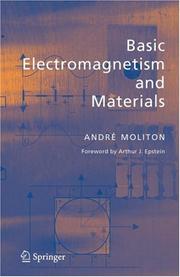
ISBN: 0387493689 0387302840 1441921397 Year: 2007 Publisher: New York, NY : Springer New York : Imprint: Springer,
Abstract | Keywords | Export | Availability | Bookmark
 Loading...
Loading...Choose an application
- Reference Manager
- EndNote
- RefWorks (Direct export to RefWorks)
Basic Electromagnetism and Materials is the product of many years of teaching basic and applied electromagnetism. This textbook can be used to teach electromagnetism to a wide range of undergraduate science majors in physics, electrical engineering or materials science. However, by making lesser demands on mathematical knowledge than competing texts, and by emphasizing electromagnetic properties of materials and their applications, this textbook is uniquely suited to students of materials science. Many competing texts focus on the study of propagation waves either in the microwave or optical domain, whereas Basic Electromagnetism and Materials covers the entire electromagnetic domain and the physical response of materials to these waves. Professor André Moliton is Director of the Unité de Microélectronique, Optoélectronique et Polymères (Université de Limoges, France), which brings together three groups studying the optoelectronics of molecular and polymer layers, micro-optoelectronic systems for telecommunications, and micro-electronics and microtechnology through the use of ion implantation and simulations.
Materials --- Electromagnetism. --- Electric properties. --- Magnetic properties. --- Electromagnetics --- Magnetic induction --- Magnetism --- Metamaterials --- Engineering --- Engineering materials --- Industrial materials --- Engineering design --- Manufacturing processes --- Optical materials. --- Computer engineering. --- Microwaves. --- Engineering. --- Magnetism. --- Classical Electrodynamics. --- Optical and Electronic Materials. --- Electrical Engineering. --- Microwaves, RF and Optical Engineering. --- Engineering, general. --- Magnetism, Magnetic Materials. --- Mathematical physics --- Physics --- Electricity --- Magnetics --- Construction --- Industrial arts --- Technology --- Hertzian waves --- Electric waves --- Electromagnetic waves --- Geomagnetic micropulsations --- Radio waves --- Shortwave radio --- Computers --- Optics --- Design and construction --- Optics. --- Electrodynamics. --- Electronic materials. --- Electrical engineering. --- Optical engineering. --- Magnetic materials. --- Mechanical engineering --- Electric engineering --- Electronic materials --- Dynamics --- Light --- Electronics --- Materials.
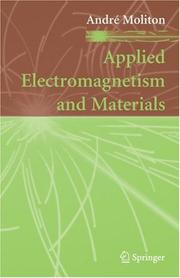
ISBN: 0387380647 0387380620 1441922830 Year: 2007 Publisher: New York, NY : Springer New York : Imprint: Springer,
Abstract | Keywords | Export | Availability | Bookmark
 Loading...
Loading...Choose an application
- Reference Manager
- EndNote
- RefWorks (Direct export to RefWorks)
Applied Electromagnetism and Materials picks up where the author's Basic Electromagnetism and Materials left off by presenting practical and relevant technological information about electromagnetic material properties and their applications. This book is aimed at senior undergraduate and graduate students as well as researchers in materials science and is the product of many years of teaching basic and applied electromagnetism. Topics range from the spectroscopy and characterization of dielectrics and semiconductors, to non-linear effects and electromagnetic cavities, to ion-beam applications in materials science.
Materials --- Electromagnetism. --- Electric properties. --- Magnetic properties. --- Electromagnetics --- Magnetic induction --- Magnetism --- Metamaterials --- Engineering --- Engineering materials --- Industrial materials --- Engineering design --- Manufacturing processes --- Optical materials. --- Microwaves. --- Engineering. --- Magnetism. --- Classical Electrodynamics. --- Optical and Electronic Materials. --- Microwaves, RF and Optical Engineering. --- Engineering, general. --- Magnetism, Magnetic Materials. --- Mathematical physics --- Physics --- Electricity --- Magnetics --- Construction --- Industrial arts --- Technology --- Hertzian waves --- Electric waves --- Electromagnetic waves --- Geomagnetic micropulsations --- Radio waves --- Shortwave radio --- Optics --- Optics. --- Electrodynamics. --- Electronic materials. --- Optical engineering. --- Magnetic materials. --- Mechanical engineering --- Electronic materials --- Dynamics --- Light --- Electronics --- Materials.
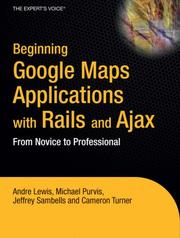
ISBN: 1280852798 9786610852796 1430203803 1590597877 9781280852794 9781430203803 Year: 2007 Publisher: Berkeley : New York : Apress ; Distributed to the Book trade worldwide by Springer-Verlag,
Abstract | Keywords | Export | Availability | Bookmark
 Loading...
Loading...Choose an application
- Reference Manager
- EndNote
- RefWorks (Direct export to RefWorks)
The Google Maps API remains one of the showcase examples of the Web 2.0 development paradigm. Beginning Google Maps Applications with Rails and Ajax: From Novice to Professional is the first book to comprehensively introduce the service from a developer perspective, showing you how you can integrate mapping features into your Rails-driven web applications. Proceeding far beyond simplistic map display, youll learn how to draw from a variety of data sources such as the U.S. Census Bureau's TIGER/Line data and Google's own geocoding feature to build comprehensive geocoding services for mapping many locations around the world. The book also steers you through various examples that show how to encourage user interaction such as through pinpointing map locations, adding comments, and building community-driven maps. Youll want to pick up a copy of this book because This is the first book to comprehensively introduce the Google Maps application development using the Rails development framework. Youll be introduced to the very latest changes to the Google Maps API, embodied in the version 2 release. It is written by four developers actively involved in the creation of location-based mapping services. For additional info, please visit the author's reference site for this book.
Ajax (Web site development technology) --- Web sites --- Authoring programs. --- Authoring programs for Web sites --- Asynchronous JavaScript and XML --- Web site development --- Design --- Computer programs --- Software --- Ruby on rails (Electronic resource) --- Google Maps. --- RoR (Electronic resource) --- Rails (Electronic resource) --- Information Technology --- General and Others --- Computer programming. --- Software engineering. --- Web Development. --- Software Engineering/Programming and Operating Systems. --- Computer software engineering --- Engineering --- Computers --- Electronic computer programming --- Electronic data processing --- Electronic digital computers --- Programming (Electronic computers) --- Coding theory --- Programming
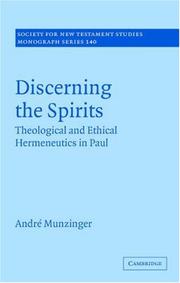
ISBN: 9780521168564 9780521875943 0521875943 9780511598104 9781107322127 110732212X 1299399800 9781299399808 0511598106 9781107316737 1107316731 9781139810715 1139810715 1107198607 110731769X 1107318629 1107315778 0511839979 0521168562 Year: 2007 Volume: 140 Publisher: Cambridge, UK New York Cambridge University Press
Abstract | Keywords | Export | Availability | Bookmark
 Loading...
Loading...Choose an application
- Reference Manager
- EndNote
- RefWorks (Direct export to RefWorks)
How did Paul determine ethical and theological truth? Were all believers expected to be able to 'discern the spirits' (1 Corinthians 12.10)? This 2007 study shows that discernment must be understood against the backdrop of an extensive hermeneutic, by which Paul inherently relates ethical and theological knowledge. Understanding the will of God requires noetic and existential transformation, in short, the 'renewal of the mind' (Romans 12.2). Munzinger argues that Paul implies a process of inspiration in which the Spirit sharpens the discerning functions of the mind because the believer is liberated from a value system dominated by status and performance. The love of God enables all believers to learn to interpret reality in a transformed manner and to develop creative solutions to questions facing their communities. For Paul authentic discernment is linked to a comprehensive sense of meaning.
Paul [Apostle] --- Discernment of spirits --- Biblical teaching --- Paul, --- Theology --- Ethics --- Bible. --- Criticism, interpretation, etc. --- 227.08 --- Spirits, Discernment of --- Demonology --- Experience (Religion) --- Psychology, Religious --- Biblical teaching. --- Paulinische theologie --- Pavel, --- Pavol, --- Paulus von Tarsus, --- Paulos, --- Pōghos, --- Paweł, --- Paweł z Tarsu, --- Būlus, --- Pablo, --- Paulo de Tarso, --- Paolo di Tarso, --- Pál, --- Apostolos Paulos --- Saul, --- القديس بولس الرسول --- بولس، --- 사도바울 --- Theology. --- Ethics. --- Epistles of Paul --- Paul, Epistles of --- Paul Sŏsin --- Pauline epistles --- Risālat al-Qiddīs Būlus al-rasūl al-thāniyah ilá Tīmūthīʼūs --- 227.08 Paulinische theologie --- Paulus, --- Pawełm --- Paulo, --- Paolo, --- Arts and Humanities --- Religion --- Discernment of spirits - Biblical teaching --- Paul, - the Apostle, Saint - Theology --- Paul, - the Apostle, Saint - Ethics --- Paul, - the Apostle, Saint
Book
ISBN: 9040082766 9789040082764 Year: 2007 Publisher: Zwolle Waanders
Abstract | Keywords | Export | Availability | Bookmark
 Loading...
Loading...Choose an application
- Reference Manager
- EndNote
- RefWorks (Direct export to RefWorks)
Book
ISSN: 0298315X ISBN: 9782204081740 2204081744 Year: 2007 Publisher: Paris: Cerf,
Abstract | Keywords | Export | Availability | Bookmark
 Loading...
Loading...Choose an application
- Reference Manager
- EndNote
- RefWorks (Direct export to RefWorks)
Loin de pouvoir être réduit à son acception contemporaine, notamment heideggérienne, le concept de finitude est un concept traditionnel. Tel est le constat qui anime cette recherche dont l'objectif est de mettre au jour certaines de ses figures dans l'histoire de la pensée. Il s'agit, en évitant toute interprétation préconçue, d'étudier, sans prétendre à l'exhaustivité, comment ce concept, d'abord présent de façon explicite dans la pensée chrétienne des premiers siècles, se renouvelle ensuite tout au long de l'histoire de la pensée. Le concept de finitude apparaît inauguralement chez Grégoire de Nysse, le théologien fondamental de l'infinité divine, pour qui " le fini " - to peratoumenon - est marqué par l'imperfection radicale de ne pas être Dieu. L'essence du fini est alors pensée grâce à la liaison platonicienne entre être et non-être. Appartenant au domaine général du fini, l'homme est en effet séparé de l'être véritable, mais il possède aussi un être propre : cette double caractéristique est une constante de l'approche chrétienne du fini, que Thomas d'Aquin exprime dans le concept d'ens finitum " participant " de l'être sans restriction dans sa restriction même. Refusant la discontinuité médiévale entre l'étant fini et son créateur, encore à leurs yeux présente chez Descartes, Leibniz et Spinoza renouvellent le concept de fini par leur ambition commune d'une rationalité infinie du fini, le premier au travers de la notion de " substance finie " dérivée de l'infini, le second par celle de " mode fini ", affection de la substance infinie. C'est contre de telles approches de la finitude que la philosophie critique réagit : " l'être raisonnable fini " de Kant est un sujet originaire et ne peut donc trouver aucun appui dans une rationalité infinie. L'idéalisme allemand entreprend de dépasser cette finitude kantienne à partir de Kant lui-même, en repensant la subjectivité transcendantale. La question du statut à accorder à la finitude - Endlichkeit - est au cœur des controverses qui l'animent. Heidegger reprendra d'abord, non sans hésitation, ce concept d'Endlichkeit, ancré dans la tradition occidentale, en parlant d'une " finitude du Dasein ", puis d'une " finitude de l'Être ", mais le poids historique d'un tel concept lui apparaîtra rapidement incompatible avec la nouveauté de sa pensée. Il ressort de cette étude que la question de la finitude consiste moins à se demander si l'homme est ou non un être fini que de déterminer de quelle finitude il est fini. Cette détermination est historiquement et philosophiquement décisive car elle concerne l'essence de l'homme, qui peut et doit " se connaître lui-même ".
Philosophical anthropology --- Metaphysics --- Finite, The --- Idéalisme allemand --- Fini --- Philosophie antique
Book
ISBN: 9789085750093 9085750091 Year: 2007 Publisher: Antwerpen : Garant,
Abstract | Keywords | Export | Availability | Bookmark
 Loading...
Loading...Choose an application
- Reference Manager
- EndNote
- RefWorks (Direct export to RefWorks)
Folklore --- Housekeeping --- Feasts in winter --- Feesten [Winter ] --- Fêtes d'hiver --- Winterfeesten --- Bread --- Myth --- Legends --- Manners and customs --- Kerstmis. --- Sinterklaas. --- feest. --- gebak. --- nieuwjaarsdag. --- voedsel. --- winter.
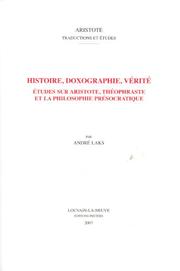
ISBN: 9789042919051 9782877239721 9042919051 2877239721 Year: 2007 Volume: *18 Publisher: Louvain-la-Neuve: Peeters,
Abstract | Keywords | Export | Availability | Bookmark
 Loading...
Loading...Choose an application
- Reference Manager
- EndNote
- RefWorks (Direct export to RefWorks)
Anaxagoras --- Aristotle --- Theophrastus of Eresus --- Pre-Socratic philosophers --- Presocratic philosophers --- Presocratici --- Presocratics --- Présocratiques --- Philosophy --- Philosophie --- Historiography. --- Historiographie --- Theophrastus --- Présocratiques --- Philosophy, Ancient --- Pre-Socratics --- Philosophers --- Ancient philosophy --- Greek philosophy --- Philosophy, Greek --- Philosophy, Roman --- Roman philosophy --- Théophraste --- Aristoteles --- Aristote --- Aristotile --- Criticism and interpretation. --- Aristotle. --- Doxographie. --- Philosophy, Ancient. --- Pre-Socratic philosophers. --- Présocratiques. --- Voorsocratici. --- Vorsokratiker. --- Historiographie. --- Aristote. --- Aristoteles, --- Theophrastus, --- Theophrastus. --- Théophraste. --- Aristoteles. --- doxographie grecque antique --- présocratiques --- philosophie --- doxographie grecque antique. --- philosophie - origine. --- philosophie grecque antique. --- Origine --- Philosophie grecque antique --- Aristote, --- Critique et interprétation. --- Feofrast --- Theophrast --- Théophraste --- Theophrastos --- Teofrasto --- Θεόφραστος --- Arisṭāṭṭil --- Aristo, --- Aristotel --- Aristotele --- Aristóteles, --- Aristòtil --- Arisṭū --- Arisṭūṭālīs --- Arisutoteresu --- Arystoteles --- Ya-li-shih-to-te --- Ya-li-ssu-to-te --- Yalishiduode --- Yalisiduode --- Ἀριστοτέλης --- Αριστοτέλης --- Аристотел --- ארסטו --- אריםטו --- אריסטו --- אריסטוטלס --- אריסטוטלוס --- אריסטוטליס --- أرسطاطاليس --- أرسططاليس --- أرسطو --- أرسطوطالس --- أرسطوطاليس --- ابن رشد --- اريسطو --- Pseudo Aristotele --- Pseudo-Aristotle --- アリストテレス --- Philosophy - Historiography.
Book
ISBN: 9782847342529 Year: 2007 Publisher: Paris Tallandier
Abstract | Keywords | Export | Availability | Bookmark
 Loading...
Loading...Choose an application
- Reference Manager
- EndNote
- RefWorks (Direct export to RefWorks)
Sociology of minorities --- History of civilization --- Redheads --- Hair --- Literature --- Roux (Personnes) --- Cheveux --- Littérature --- History --- Social aspects --- History and criticism --- Histoire --- Aspect social --- Histoire et critique --- Littérature --- Social aspects. --- Rousseur --- Préjugés
Book
ISBN: 9782711619139 2711619133 Year: 2007 Volume: *5 Publisher: Paris: Vrin,
Abstract | Keywords | Export | Availability | Bookmark
 Loading...
Loading...Choose an application
- Reference Manager
- EndNote
- RefWorks (Direct export to RefWorks)
| Listing 1 - 10 of 1161 | << page >> |
Sort by
|

 Search
Search Feedback
Feedback About UniCat
About UniCat  Help
Help News
News